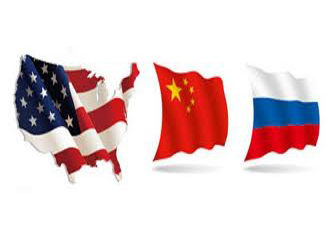Changes in the international political and security situation of the 21st century have taken place mainly around two main themes: U.S.-led actions against terrorism and proliferation, and geopolitical and geo-economic competition between major powers in the world. With the U.S. contracting its direct actions in Iraq and Afghanistan by withdrawing forces and shelving the DPRK nuclear issue, changes in global strategic situation now mainly reflect geopolitical jostling. Changes in China-U.S.-Russia relations are core components to this theme, suggesting with increasing clarity that the Russian factor has postponed the beginning of an era of comprehensive strategic game between China and the U.S.
The event of 9/11 made it clear that international political and security challenges for the U.S. would no longer come from rising powers alone. However, anti-terrorism and counter-proliferation occupied the most important position in America’s global strategy only rather briefly. As the U.S. achieved victory rather quickly in Afghanistan and Iraq in 2001 and 2003 respectively and the situations in the two countries were relatively stable, the George W. Bush Administration thought it opportune to make geopolitical arrangements by way of expanding democracy, which virtually re-target the country’s external strategy against rising big countries that may come in a position to challenge its unipolar leadership.
The geopolitical game between the U.S. and Russia in 2004 over Ukraine general election in 2004 ended in American victory in January 2005. Then Russia instigated Uzbekistan to evict the U.S. from its air base, the first major diplomatic setback for the U.S. in Central Asia since disintegration of the former Soviet Union. Given the tendency of a China-Russia coalition shown in the joint statement of the Shanghai Cooperation Organization summit meeting in early July that year, America put forward the “stakeholder” concept in September. Meanwhile, Russia showed again an obvious tendency to join forces with China to compete with the U.S. in its joint military exercises with China in the summer of 2005. In the years that followed, Russia-U.S. relations continually worsened due to the Iranian question and the U.S. missile defense deployment in Eastern Europe. Out of the need to stabilize relations with China while being tough towards Russia, the George W. Bush Administration adopted an explicit repressive attitude towards pro-independence forces in Taiwan.
Since the outbreak of the global financial crisis, the Chinese economy has maintained its robust growth, rapidly increasing trade and investment in other countries, the Asia Pacific region in particular, and with rapid upgrading of military technologies. As a result, the U.S. feels that its economic and financial status in the world has been challenged by China and that such challenge will gradually grow to the extent of threatening its global leadership. While the gravity of America’s global strategy shifts towards Asia Pacific, the U.S. is confronted with the question of rebalancing Europe, which has lost its traditional status as the centre of gravity. In this connection, the U.S. has to reset its policy towards Russia.
In the fours years before November 2013 when the Ukraine crisis broke out, the resetting policy was implemented and the U.S. gradually shifted its power towards newly identified area of strategic gravity. The shift has been conducted with theory (America’s Pacific Century, Hillary Clinton), strategy (Sustaining U.S. Global Leadership: Priorities for 21st Century Defense, DOD), transfer and redeployment of military forces towards Asia Pacific, remaking of the alliance system in the region and establishing the TTP to gain trade and investment advantages, all of which constitute initial preparations for a comprehensive game with China in all relevant areas.
The Ukraine crisis has objectively postponed the beginning of such a comprehensive game. The profound external reason behind the crisis had been Putin’s idea to create a Eurasian union capable of being one pole in the modern world, in fundamental conflict with the U.S. vision of maintaining existing security and economic structure in Europe after its strategic shift east.
It is undeniable that the U.S. also had a serious strategic miscalculation in handling the Ukraine crisis. America thought that Russia would helplessly accept the overthrow of the Yanukovich government as it had helplessly accepted the victory of West-supported Yushenko in the second round of presidential election to replace Yanukovich who won the first round. With this, the possibility of Ukraine joining the Eurasian Union would disappear and the crisis would end soon, allowing the U.S. to focus on its strategic shift east. Russia unexpectedly took Crimea and supported southeast Ukraine in making trouble for the new Ukraine government, leading to prolonged turbulences in the region and precluding a prompt exit by the U.S. Against this backdrop, the U.S. must be mindful that its policy towards China should help prevent China and Russia to become too close to each other. Thus the deployment of diplomatic resources and the formulation of polices have to take into account the Ukraine crisis.
In short, the intensification of Russia-U.S. tensions put an end to the reactivation of their relations, has an objective impact on America’s strategic shift east and delays the beginning of a comprehensive strategic game between China and U.S. If China-U.S. relationship can be described as one of competition with deepening mutual dependence, the later such a game begins, the better chance for the two countries to move towards a cooperation-centered game instead of a confrontational one.

